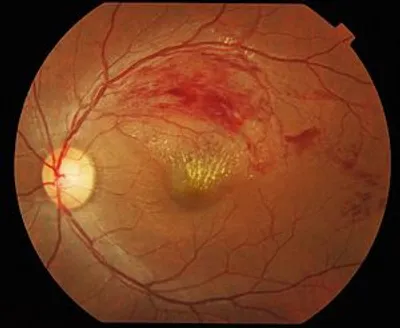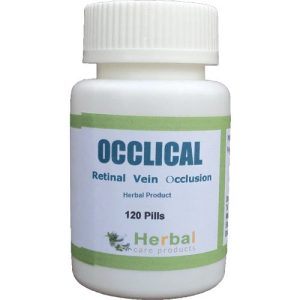No products in the cart.
Return To Shop 0 Cart $0.00 0
No products in the cart.
Return To Shop Shopping cart (0)
Subtotal: $0.00
Free shipping over 299$
Revolutionizing the Treatment of Retinal Vein Occlusion: Exploring New and Exciting Therapies
Retinal vein occlusion is a frustrating and often debilitating condition that affects thousands of people worldwide. This disease can cause severe vision loss and can significantly impact the quality of life of those who suffer from it. However, recent developments in the field of ophthalmology have led to the emergence of new and exciting treatment options for retinal vein occlusion. These cutting-edge therapies have the potential to revolutionize the way this condition is managed and treated. In this blog post, we will explore the latest developments in the treatment of retinal vein occlusion and discuss how these new therapies are improving the lives of those affected by this condition.

Overview of Retinal Vein Occlusion
Retinal Vein Occlusion (RVO) is a serious condition that can lead to partial or complete vision loss. It occurs when there is a blockage in the veins in the retina, which can result in hemorrhages, swelling, and damage to the surrounding tissue. Traditional treatments for RVO have included laser therapy and injections of steroids or anti-VEGF medications. However, new therapies are being developed that could enhance the treatment of this condition. These include gene therapy, stem cell therapy, and new drug delivery systems. Some of these therapies have shown promising results in pre-clinical trials, and clinical trials are currently underway to determine their safety and effectiveness in treating retinal vein occlusion. These new therapies could significantly improve the outlook for patients with RVO, providing new hope for those affected by this serious condition.
New therapies are being developed that could enhance the treatment of retinal vein occlusion (RVO). Commonly used treatments for RVO include laser treatment, injections of anti-VEGF drugs, and medications that target elevated intraocular pressure. Laser treatment involves the use of a laser to seal off leaking blood vessels in the eye, while anti-VEGF drugs block the growth of abnormal blood vessels that can lead to RVO. Medications that target elevated intraocular pressure can also be used to prevent further damage to the eye. However, these treatments are not always effective or suitable for all patients. As a result, researchers are exploring new therapies that use gene therapy, stem cells, and other innovative approaches to improve the treatment of RVO. These therapies aim to address the underlying causes of RVO and restore vision to those affected by this condition. With continued research and development, new therapies could provide hope for those living with RVO and improve their quality of life.
In conclusion, retinal vein occlusion (RVO) is a serious condition that can lead to significant vision loss if left untreated. While current treatments have shown some success, they often have limited efficacy and can require multiple visits to the doctor. However, new therapies such as anti-VEGF drugs and gene therapy show promise in treating RVO more effectively and efficiently. These innovative treatments offer better patient outcomes and improved quality of life, helping individuals suffering from RVO to regain their vision and lead a normal life. As research in this field continues to evolve, it is hopeful that more effective and accessible treatments will become readily available to those in need.
New and Exciting Therapies for Revolutionary Treatment
In recent years, a number of new and exciting therapies have become available to those suffering from retinal vein occlusion. These treatments, including laser photocoagulation and intravitreal injections, offer the potential to revolutionize the way we treat this condition. Laser photocoagulation involves using a high-intensity beam of light to seal off damaged blood vessels in the retina, while intravitreal injections use specialized medications to reduce inflammation and promote healing. Both of these treatments have been shown to be highly effective in improving vision and reducing the risk of complications associated with retinal vein occlusion. As such, patients with this condition now have more options than ever before when it comes to managing their symptoms and improving their quality of life.
Additionally, these new therapies for retinal vein occlusion offer a more personalized approach to treatment. They are tailored to each patient’s individual needs and circumstances, allowing for a more efficient use of resources and better outcomes. Furthermore, they provide a minimally invasive approach to treatment, allowing for a shorter recovery time and less discomfort for patients. As new therapies continue to emerge in the field of retinal vein occlusion treatment, it is clear that patients will benefit from more effective and efficient treatments that meet their unique needs. By embracing these new therapies, we can help ensure that patients receive the best care possible for this challenging condition.
Related Articles: New Treatment for Retinal Vein Occlusion offers hope for better vision
Wrapping up
In conclusion, the emergence of new and exciting therapies for the treatment of retinal vein occlusion is a welcome development in the field of ophthalmology. These cutting-edge treatments have the potential to revolutionize the way this condition is managed, offering hope to the millions of people worldwide who suffer from it. As we continue to explore and develop these therapies, we can look forward to a future where the impact of retinal vein occlusion is significantly reduced and the quality of life of those affected is improved. With these advancements, we take another step closer to a world where vision loss is no longer a barrier to living a fulfilling life.
More
More

